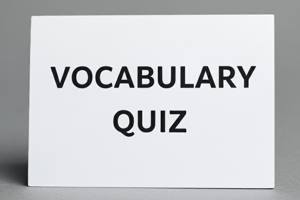Podcast
Questions and Answers
What is an essential feature of effective abstract writing?
What is an essential feature of effective abstract writing?
- Lengthy explanations of concepts
- Economical use of language (correct)
- Inclusion of personal opinions
- Use of complex vocabulary
Which writing format is commonly used for official communication?
Which writing format is commonly used for official communication?
- Informal email format
- Formal letter format (correct)
- Freestyle poem format
- Play script format
What role does the passive voice serve in official letter writing?
What role does the passive voice serve in official letter writing?
- To maintain objectivity (correct)
- To make the writing more casual
- To create emotional appeals
- To express strong opinions
What is a key consideration when drafting a CV?
What is a key consideration when drafting a CV?
Which aspect of communication is crucial in seminar presentations?
Which aspect of communication is crucial in seminar presentations?
Which of the following is NOT a grammatical category discussed in the course content?
Which of the following is NOT a grammatical category discussed in the course content?
What type of sentence is used to ask a question?
What type of sentence is used to ask a question?
Which modal verb would be most appropriate to express obligations or duties?
Which modal verb would be most appropriate to express obligations or duties?
Which outcome focuses on improving self-competence in language usage?
Which outcome focuses on improving self-competence in language usage?
Which of the following is a skill developed under the Basics of Writing?
Which of the following is a skill developed under the Basics of Writing?
What type of reading skill is introduced in Unit-II?
What type of reading skill is introduced in Unit-II?
Which sentence type expresses strong feelings or emotions?
Which sentence type expresses strong feelings or emotions?
Which of the following is not a focus area under 'Basics of Reading'?
Which of the following is not a focus area under 'Basics of Reading'?
Flashcards
Simple Sentences
Simple Sentences
Sentences with one independent clause, a subject, and a verb.
Descriptive Sentences
Descriptive Sentences
Sentences that describe something or someone.
Auxiliary Verbs
Auxiliary Verbs
Helping verbs that combine with main verbs to create tense, mood, and voice.
Modal Verbs
Modal Verbs
Signup and view all the flashcards
Subject-Verb Agreement
Subject-Verb Agreement
Signup and view all the flashcards
Articles (a, an, the)
Articles (a, an, the)
Signup and view all the flashcards
Prepositions
Prepositions
Signup and view all the flashcards
Active Voice
Active Voice
Signup and view all the flashcards
Passive Voice
Passive Voice
Signup and view all the flashcards
Declarative Sentences
Declarative Sentences
Signup and view all the flashcards
Interrogative Sentences
Interrogative Sentences
Signup and view all the flashcards
Imperative Sentences
Imperative Sentences
Signup and view all the flashcards
Exclamatory Sentences
Exclamatory Sentences
Signup and view all the flashcards
Narrative Texts
Narrative Texts
Signup and view all the flashcards
Descriptive Texts
Descriptive Texts
Signup and view all the flashcards
Extrapolative Texts
Extrapolative Texts
Signup and view all the flashcards
Abstract Writing
Abstract Writing
Signup and view all the flashcards
Proposal Abstract Formats
Proposal Abstract Formats
Signup and view all the flashcards
Research Article Abstracts
Research Article Abstracts
Signup and view all the flashcards
Keywords
Keywords
Signup and view all the flashcards
Official Letter Writing Format
Official Letter Writing Format
Signup and view all the flashcards
Passive Voice in Letter Writing
Passive Voice in Letter Writing
Signup and view all the flashcards
Formal English in Official Letters
Formal English in Official Letters
Signup and view all the flashcards
Request Letters
Request Letters
Signup and view all the flashcards
Joining Letters
Joining Letters
Signup and view all the flashcards
Letters of Invitation
Letters of Invitation
Signup and view all the flashcards
Email-Letter Communication
Email-Letter Communication
Signup and view all the flashcards
Tentative Register
Tentative Register
Signup and view all the flashcards
Impersonal Language Skills
Impersonal Language Skills
Signup and view all the flashcards
CV Format
CV Format
Signup and view all the flashcards
Quantitative Data
Quantitative Data
Signup and view all the flashcards
Qualitative Data
Qualitative Data
Signup and view all the flashcards
Dynamic CV
Dynamic CV
Signup and view all the flashcards
Cover Letter Writing
Cover Letter Writing
Signup and view all the flashcards
Listening Skills
Listening Skills
Signup and view all the flashcards
Unfamiliar Dialects
Unfamiliar Dialects
Signup and view all the flashcards
Pronunciation and Fluency
Pronunciation and Fluency
Signup and view all the flashcards
Intelligibility
Intelligibility
Signup and view all the flashcards
Study Notes
English Communication Course
- Course Goal: Help students become familiar with grammar nuances, build confidence in grammar's learnable nature, and raise awareness of language and its grammatical variety.
- Course Structure: Divided into four sections:
- A. Grammar
- B. Listening and Speaking
- C. Basics of Reading
- D. Basics of Writing
- Course Learning Outcomes (CLOs):
- Identify non-standard English usage (written and spoken).
- Recognize and correct usage errors.
- Improve language competence.
- Understand regional English dialects.
- Speak confidently and intelligibly.
- Value reading's importance.
- Develop a reading habit.
- Comprehend unfamiliar texts independently.
- Appreciate writing's role in academic life.
- Write simple sentences without grammatical errors.
Unit I: Major Basic Grammatical Categories
- Focus: Correctness and error correction in various sentence types.
- Topics:
- Simple sentences (using primary auxiliaries).
- Descriptive Sentences
- Expressing possibilities and probabilities (using 'can', 'may').
- Expressing future plans, goals, etc. (using 'shall', 'will').
- Expressing obligations, duties (using 'should', 'ought', 'might').
- Expressing possessions (using 'have', 'has', 'had').
- Subject-verb agreement, articles, prepositions, modal verbs.
- Active and passive voice.
- Declarative, interrogative, imperative, exclamatory sentences.
- Question types (Wh-, Yes-No, Tag).
Unit II: Introduction to Reading Skills
- Focus: Different text types (narrative, descriptive, extrapolative).
- Topics:
- Type identification.
- Comprehension of various reading texts.
Unit III: Introduction to Writing Skills
- Focus: Technical writing.
- Topics:
- Report writing (news reports, project reports, event reporting).
- Academic writing (Abstracts, proposals, research articles, keywords).
- Scientific abstract writing (concise and effective).
Unit IV: Official Communication
- Focus: Official and formal letter writing.
- Topics:
- Letter writing format (official correspondence).
- Passive voice use in formal letters.
- Formal English usage.
- Letters for requests, invitations, etc.
- International email communication.
- Scientific communication.
- CV format and cover letter writing.
Assessment
- Areas: Listening skills, pronunciation, fluency, speaking in seminars, ability to understand unfamiliar dialects.
Studying That Suits You
Use AI to generate personalized quizzes and flashcards to suit your learning preferences.





